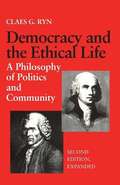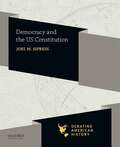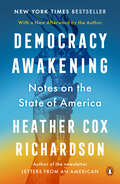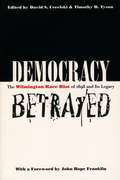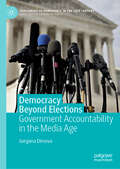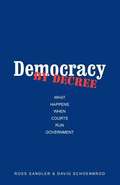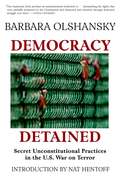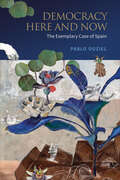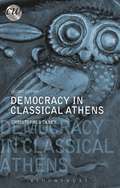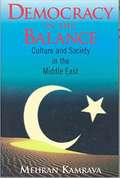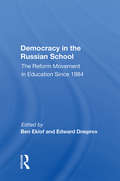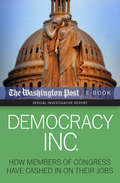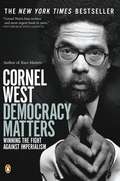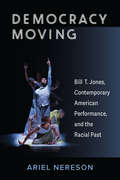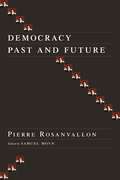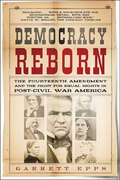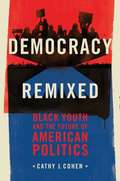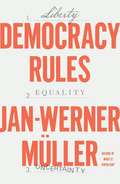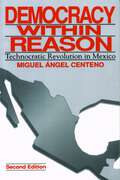- Table View
- List View
Democracy And The Ethical Life: A Philosophy Of Politics And Community (Second Edition, Expanded)
by Claes G. RynThis study goes to the heart of ethics and politics. Strongly argued and lucidly written, the book makes a crucial distinction between two forms of democracy
Democracy And The Us Constitution (Debating American History Ser.)
by Joel M. Sipress David J. VoelkerEmbracing an argument-based model for teaching history, the Debating American History series encourages students to participate in a contested, evidence-based discourse about the human past. Each book poses a question that historians debate--How democratic was the U.S. Constitution? or Why did civil war erupt in the United States in 1861?--and provides abundant primary sources so that students can make their own efforts at interpreting the evidence. They can then use that analysis to construct answers to the big question that frames the debate and argue in support of their position. Democracy and the US Constitution poses this big question: How democratic was the U.S. Constitution?
Democracy At War: America's Fight at Home and Abroad in World War II
by William L. O'NeillAs America fought to defend democracy in Europe and Asia during World War II, its own democratic politics both aided and impeded the war effort at home and the military campaigns abroad.
Democracy Awakening: Notes on the State of America
by Heather Cox RichardsonA New York Times BestsellerA vital and urgent call to action about the precarious state of American democracy, charting its historical challenges and current threats, from one of our era&’s most important and insightful historians, with a new afterword by the author.&“Magisterial.&” –The Washington Post&“An excellent primer for anyone who needs the important facts of the last 150 years of American history–and how they got us to the sorry place we inhabit today.&” –GuardianAt a time when the very foundations of American democracy seem under threat, the lessons of the past offer a road map for navigating a moment of political crisis. In Democracy Awakening, acclaimed historian Heather Cox Richardson delves into the tumultuous journey of American democracy, tracing the roots of Donald Trump&’s &“authoritarian experiment&” to the earliest days of the republic. She examines the historical forces that have led to the current political climate, showing how modern conservatism has preyed upon a disaffected population, weaponizing language and promoting false history to consolidate power.With remarkable clarity and the same accessible voice that brings millions to her newsletter, Letters from an American, Richardson wrangles a chaotic news feed into a story that pivots effortlessly from the Founders to the abolitionists to Nixon to the January 6 insurrection. An essential read for anyone concerned about the state of America, Democracy Awakening is more than a history book; it&’s a call to action. Richardson reminds us that democracy requires constant vigilance and participation from all of us, showing how we, as a nation, can take the lessons of the past to secure a more just and equitable future.
Democracy Betrayed
by Timothy B. Tyson David S. CecelskiAt the close of the nineteenth century, the Democratic Party in North Carolina engineered a white supremacy revolution. Frustrated by decades of African American self-assertion and threatened by an interracial coalition advocating democratic reforms, white conservatives used violence, demagoguery, and fraud to seize political power and disenfranchise black citizens. The most notorious episode of the campaign was the Wilmington "race riot" of 1898, which claimed the lives of many black residents and rolled back decades of progress for African Americans in the state.Published on the centennial of the Wilmington race riot, Democracy Betrayed draws together the best new scholarship on the events of 1898 and their aftermath. Contributors to this important book hope to draw public attention to the tragedy, to honor its victims, and to bring a clear and timely historical voice to the debate over its legacy.The contributors are David S. Cecelski, William H. Chafe, Laura F. Edwards, Raymond Gavins, Glenda E. Gilmore, John Haley, Michael Honey, Stephen Kantrowitz, H. Leon Prather Sr., Timothy B. Tyson, LeeAnn Whites, and Richard Yarborough.
Democracy Beyond Elections: Government Accountability in the Media Age (Challenges to Democracy in the 21st Century)
by Gergana DimovaThis book provides the analytical framework for understanding the relationship between media scandals, executive accountability and the crisis of democracy. The empirical findings are based on an original database of 6000 media allegations and investigations in Russia, Germany and Bulgaria. Observations gained from the case studies are then placed in relation to a systematic analysis and critique of more than 100 models of the transformation and crisis of democracy. The book will be of particular interest to researchers focusing on democratic theory and political thought, as well as those working empirically in the field of democratic systems.
Democracy By Decree: What Happens When Courts Run Government
by Ross Sandler David SchoenbrodThis valuable book explains why schools, welfare agencies, and other important state and local institutions have come to be controlled by attorneys and judges rather than by governors and mayors. The authors discuss why this has resulted in worse service to the public and what can be done to restore control of these programs to elected—and accountable—officials.
Democracy Deferred
by David W. WoodsThe day after the 9/11 terrorist attacks, civic leaders began to organize four coalitions that aimed to give ordinary citizens a chance to meet, to heal, and to be heard in rebuilding decisions. This book tells the inside story of the civic renewal movement they founded.
Democracy Derailed in Russia
by M. Steven FishWhy has democracy failed to take root in Russia? After shedding the shackles of Soviet rule, some countries in the postcommunist region undertook lasting democratization. Yet Russia did not. Russia experienced dramatic political breakthroughs in the late 1980s and early 1990s, but it subsequently failed to maintain progress toward democracy. In this book, M. Steven Fish offers an explanation for the direction of regime change in post-Soviet Russia. Relying on cross-national comparative analysis as well as on in-depth field research in Russia, Fish shows that Russia's failure to democratize has three causes: too much economic reliance on oil, too little economic liberalization, and too weak a national legislature. Fish's explanation challenges others that have attributed Russia's political travails to history, political culture, or to 'shock therapy' in economic policy. The book offers a theoretically original and empirically rigorous explanation for one of the most pressing political problems of our time.
Democracy Detained: Military Tribunals and the Threat to Democracy
by Barbara Olshansky Nat HentoffDemocracy Detained exposes the deplorable secret crimes committed by the Bush administration in their war on terror. Prominent legal activist Barbara Olshansky documents the assault on our constitutional democracy since 9/11, meticulously analyzing the unlawful justifications made by the U.S. government for covert actions at home and abroad. She reports on current shocking practices, from the outsourcing of torture through extraordinary rendition, to first-person testimony from innocent men imprisoned without charge at Guantánamo Bay, to revelations of a surveillance network tapped into the homes of average citizens. Democracy Detained is an essential resource for Americans concerned about their civil rights.
Democracy Disfigured
by Nadia UrbinatiIn "Democracy Disfigured, "Nadia Urbinati diagnoses the ills that beset the body politic in an age of hyper-partisanship and media monopolies and offers a spirited defense of the messy compromises and contentious outcomes that define democracy. Urbinati identifies three types of democratic disfiguration: the unpolitical, the populist, and the plebiscitarian. Each undermines a crucial division that a well-functioning democracy must preserve: the wall separating the free forum of public opinion from the governmental institutions that enact the will of the people. Unpolitical democracy delegitimizes political opinion in favor of expertise. Populist democracy radically polarizes the public forum in which opinion is debated. And plebiscitary democracy overvalues the aesthetic and nonrational aspects of opinion. For Urbinati, democracy entails a permanent struggle to make visible the issues that citizens deem central to their lives. Opinion is thus a form of action as important as the mechanisms that organize votes and mobilize decisions. Urbinati focuses less on the overt enemies of democracy than on those who pose as its friends: technocrats wedded to procedure, demagogues who make glib appeals to "the people," and media operatives who, given their preference, would turn governance into a spectator sport and citizens into fans of opposing teams.
Democracy Here and Now: The Exemplary Case of Spain
by Pablo OuzielIn Spain, on 15 May 15, 2011, a movement against austerity measures began. In a time when representative democracies were under threat, 15M came to life as a virtuous and democratic response to the slide into far-right populism and authoritarianism. More than a social movement, 15M became a mode of being with transformative, democratizing potential. In Democracy Here and Now, Pablo Ouziel offers a grounded analysis of 15M. At the time of the movement and during the ensuing encampments, Ouziel travelled extensively, speaking to participants, and keeping an ongoing record of his conversations. Presenting an original participatory mode of research, the book reveals six types of intersubjective, "joining hands" relationships that 15M has brought into being and works to carry on in creative ways. The book shows how the movement’s way of being and temporality persists in Spain following the square occupations, while 15M citizens continue to learn and move forward in less perceptible ways. Democracy Here and Now sheds light on a deeply relational, intersectional, and eco-social mode of democracy, and shows how 15M’s ongoing democratization practices are exemplary of similar grassroots movements around the world, broadening our understandings of what it means to be democratic in the here and now.
Democracy In Classical Athens (Classical World Ser.)
by Christopher CareyFor two centuries classical Athens enjoyed almost uninterrupted democratic government. This was not a parliamentary democracy of the modern sort but a direct democracy in which all citizens were free to participate in the business of government. Throughout this period Athens was the cultural centre of Greece and one of the major Greek powers. This book traces the development and operation of the political system and explores its underlying principles. Christopher Carey assesses the ancient sources of the history of Athenian democracy and evaluates criticisms of the system, ancient and modern. He also provides a virtual tour of the political cityscape of ancient Athens, describing the main political sites and structures, including the theatre. <P><P>With a new chapter covering religion in the democratic city, this second edition benefits from updates throughout that incorporate the latest research and recent archaeological findings in Athens. A clearer structure and layout make the book more accessible to students, as do extra images and maps along with a timeline of key events.
Democracy In The Balance: Culture And Society In The Middle East
by Mehran KamravaExamining the social and cultural forces that have hindered the emergence and widespread development of democratic polities in the Middle East, Mehran Kamrava analyzes the effect politics, in particular, and society-based dynamics, in general, have had on the nature and evolution of Middle Eastern culture.
Democracy In The Russian School: The Reform Movement In Education Since 1984
by Ben Eklof Edward DneprovFramed by an introductory essay by Ben Ekiof, the translated documents in this volume are crucial to understanding Russian educational reform efforts. These primary sources, based on previously unpublished statistical data and public opinion surveys, depict current conditions in Russia's schools. Reflecting the approach of the leading historian of education Edward Dneprov-now the powerful minister of education serving under Boris Yeltsin-the documents describe the radical reform philosophy and program first published in Teachers' Gazette in 1988, which now serve as the operative legislation for all secondary schools. The VNIK (Temporary Scientific Research Collective on the Schools) reform movement is a fascinating microcosm of perestroika in terms of goals, mobilization, and the complicated, painful process of implementation. This unique glimpse into Russian education in a period of turmoil will interest all those who follow Russian politics and society.
Democracy Inc.: How Members of Congress Have Cashed In On Their Jobs (Special Investigative Report)
by Scott Higham The Washington Post David S. Fallis Dan Keating Kimberly KindyAn investigation into how legislators have taken advantage of their positions—and of weak financial disclosure laws—to make millions. After a historic financial crisis led Congress to unprecedented economic intervention, the Pulitzer Prize-winning Washington Post began an investigation that pierced the secrecy of the deeply flawed financial disclosure system that governs the 535 men and women who draft the nation&’s laws. Members of Congress directed millions of dollars to infrastructure projects near their residences and businesses, in some cases paving roads in front of their houses. They made major trades in the stocks of companies pressing them for legislation. They wrote laws favoring industries in which they were invested. They sponsored bills on which their own family members were paid to lobby. All of it is legal under the rules Congress has written for itself. Democracy Inc. shows the consequences of this system.
Democracy Matters: Winning the Fight Against Imperialism
by Cornel WestIn his major bestseller, Race Matters, philosopher Cornel West burst onto the national scene with his searing analysis of the scars of racism in American democracy. Race Matters has become a contemporary classic, still in print after ten years, having sold more than four hundred thousand copies. A mesmerizing speaker with a host of fervidly devoted fans, West gives as many as one hundred public lectures a year and appears regularly on radio and television. Praised by The New York Times for his "ferocious moral vision" and hailed by Newsweek as "an elegant prophet with attitude," he bridges the gap between black and white opinion about the country's problems.<P><P> In Democracy Matters, West returns to the analysis of the arrested development of democracy-both in America and in the crisis-ridden Middle East. In a strikingly original diagnosis, he argues that if America is to become a better steward of democratization around the world, we must first wake up to the long history of imperialist corruption that has plagued our own democracy. Both our failure to foster peace in the Israeli-Palestinian conflict and the crisis of Islamist anti-Americanism stem largely from hypocrisies in our dealings with the world. Racism and imperial expansionism have gone hand in hand in our country's inexorable drive toward hegemony, and our current militarism is only the latest expression of that drive. Even as we are shocked by Islamic fundamentalism, our own brand of fundamentalism, which West dubs Constantinian Christianity, has joined forces with imperialist corporate and political elites in an unholy alliance, and four decades after the murder of Dr. Martin Luther King, Jr., insidious racism still inflicts debilitating psychic pain on so many of our citizens.<P> But there is a deep democratic tradition in America of impassioned commitment to the fight against imperialist corruptions-the last great expression of which was the civil rights movement led by Dr. King-and West brings forth the powerful voices of that great democratizing tradition in a brilliant and deeply moving call for the revival of our better democratic nature. His impassioned and provocative argument for the revitalization of America's democracy will reshape the terms of the raging national debate about America's role in today's troubled world.
Democracy Moving: Bill T. Jones, Contemporary American Performance, and the Racial Past (Theater: Theory/Text/Performance)
by Ariel NeresonOn the 200th anniversary of Abraham Lincoln’s birth, renowned choreographer and director Bill T. Jones developed three tributes: Serenade/The Proposition, 100 Migrations, and Fondly Do We Hope . . . Fervently Do We Pray. These widely acclaimed dance works incorporated video and audio text from Lincoln’s writings as they examined key moments in his life and his enduring legacy. Democracy Moving explores how these works provided both an occasion and a method by which democracy and history might be reconceived through movement, positioning dance as a form of both history and historiography. The project addresses how different communities choose to commemorate historical figures, events, and places through art—whether performance, oratory, song, statuary, or portraiture—and in particular, Black US American counter-memorial practices that address histories of slavery. Advancing the theory of oscillation as Black aesthetic praxis, author Ariel Nereson celebrates Bill T. Jones as a public intellectual whose practice has contributed to the project of understanding America’s relationship to its troubled past. The book features materials from Bill T. Jones/Arnie Zane Company’s largely unexplored archive, interviews with artists, and photos that document this critical stage of Jones’s career as it explores how aesthetics, as ideas in action, can imagine more just and equitable social formations.
Democracy Moving: Bill T. Jones, Contemporary American Performance, and the Racial Past (Theater: Theory/Text/Performance)
by Ariel NeresonOn the 200th anniversary of Abraham Lincoln’s birth, renowned choreographer and director Bill T. Jones developed three tributes: Serenade/The Proposition, 100 Migrations, and Fondly Do We Hope . . . Fervently Do We Pray. These widely acclaimed dance works incorporated video and audio text from Lincoln’s writings as they examined key moments in his life and his enduring legacy. Democracy Moving explores how these works provided both an occasion and a method by which democracy and history might be reconceived through movement, positioning dance as a form of both history and historiography. The project addresses how different communities choose to commemorate historical figures, events, and places through art—whether performance, oratory, song, statuary, or portraiture—and in particular, Black US American counter-memorial practices that address histories of slavery. Advancing the theory of oscillation as Black aesthetic praxis, author Ariel Nereson celebrates Bill T. Jones as a public intellectual whose practice has contributed to the project of understanding America’s relationship to its troubled past. The book features materials from Bill T. Jones/Arnie Zane Company’s largely unexplored archive, interviews with artists, and photos that document this critical stage of Jones’s career as it explores how aesthetics, as ideas in action, can imagine more just and equitable social formations.
Democracy Past and Future
by Samuel MoynOne of Europe's leading contemporary political thinkers proposes provocative new readings of the history, aims, scope, and possibility of democratic theory and practice today.
Democracy Past and Future (Political Thought / Political History)
by Pierre RosanvallonDemocracy Past and Future is the first English-language collection of Pierre Rosanvallon's most important essays on the historical origins, contemporary difficulties, and future prospects of democratic life.One of Europe's leading political thinkers, Rosanvallon proposes in these essays new readings of the history, aims, and possibilities of democratic theory and practice, and provides unique theoretical understandings of key moments in democracy's trajectory, from the French Revolution and the struggles for universal suffrage to European unification and the crises of the present. In so doing, he lays out an influential new theory of how to write the history of politics. Rosanvallon's historical and philosophical approach examines the "pathologies" that have curtailed democracy's potential and challenges the antitotalitarian liberalism that has dominated recent political thought. All in all, he adroitly combines historical and theoretical analysis with an insistence on the need for a new form of democracy. Above all, he asks what democracy means when the people rule but are nowhere to be found.Throughout his career, Rosanvallon has resisted simple categorization. Rosanvallon was originally known as a primary theorist of the "second left", which hoped to stake out a non-Marxist progressive alternative to the irresistible appeal of revolutionary politics. In fact, Rosanvallon revived the theory of "civil society" even before its usage by East European dissidents made it globally popular as a non-statist politics of freedom and pluralism. His ideas have been shaped by a variety of influences, ranging from his work with an influential French union to his teachers François Furet and Claude Lefort.Well known throughout Europe as a historian, political theorist, social critic, and public intellectual, Pierre Rosanvallon was recently elected to a professorship at the Collège de France, Paris, a position held at various times by Claude Lévi-Strauss, Michel Foucault, and Pierre Bourdieu. Democracy Past and Future begins with Rosanvallon's groundbreaking and synthetic lecture that he delivered upon joining this institution. Throughout the volume, Rosanvallon illuminates and invigorates contemporary political and democratic thought.
Democracy Reborn: The Fourteenth Amendment and the Fight for Equal Rights in Post–Civil War America
by Garrett EppsA riveting narrative of the adoption of the Fourteenth Amendment, an act which revolutionized the U.S. constitution and shaped the nation's destiny in the wake of the Civil WarThough the end of the Civil War and Lincoln's Emancipation Proclamation inspired optimism for a new, happier reality for blacks, in truth the battle for equal rights was just beginning. Andrew Johnson, Lincoln's successor, argued that the federal government could not abolish slavery. In Johnson's America, there would be no black voting, no civil rights for blacks.When a handful of men and women rose to challenge Johnson, the stage was set for a bruising constitutional battle. Garrett Epps, a novelist and constitutional scholar, takes the reader inside the halls of the Thirty-ninth Congress to witness the dramatic story of the Fourteenth Amendment's creation. At the book's center are a cast of characters every bit as fascinating as the Founding Fathers. Thaddeus Stevens, Charles Sumner, Frederick Douglass, Susan B. Anthony, among others, understood that only with the votes of freed blacks could the American Republic be saved.Democracy Reborn offers an engrossing account of a definitive turning point in our nation's history and the significant legislation that reclaimed the democratic ideal of equal rights for all U.S. citizens.
Democracy Remixed
by Cathy J. CohenIn Democracy Remixed, award-winning scholar Cathy J. Cohen offers an authoritative and empirically powerful analysis of the state of black youth in America today. Utilizing the results from the Black Youth Project, a groundbreaking nationwide survey, Cohen focuses on what young Black Americans actually experience and think--and underscores the political repercussions. Featuring stories from cities across the country, she reveals that black youth want, in large part, what most Americans want--a good job, a fulfilling life, safety, respect, and equality. But while this generation has much in common with the rest of America, they also believe that equality does not yet exist, at least not in their lives. Many believe that they are treated as second-class citizens. Moreover, for many the future seems bleak when they look at their neighborhoods, their schools, and even their own lives and choices. Through their words, these young people provide a complex and balanced picture of the intersection of opportunity and discrimination in their lives. Democracy Remixed provides the insight we need to transform the future of young Black Americans and American democracy.
Democracy Rules
by Jan-Werner MüllerA much-anticipated guide to saving democracy, from one of our most essential political thinkers.Everyone knows that democracy is in trouble, but do we know what democracy actually is? Jan-Werner Müller, author of the widely translated and acclaimed What Is Populism?, takes us back to basics in Democracy Rules. In this short, elegant volume, he explains how democracy is founded not just on liberty and equality, but also on uncertainty. The latter will sound unattractive at a time when the pandemic has created unbearable uncertainty for so many. But it is crucial for ensuring democracy’s dynamic and creative character, which remains one of its signal advantages over authoritarian alternatives that seek to render politics (and individual citizens) completely predictable. Müller shows that we need to re-invigorate the intermediary institutions that have been deemed essential for democracy’s success ever since the nineteenth century: political parties and free media. Contrary to conventional wisdom, these are not spent forces in a supposed age of post-party populist leadership and post-truth. Müller suggests concretely how democracy’s critical infrastructure of intermediary institutions could be renovated, re-empowering citizens while also preserving a place for professionals such as journalists and judges. These institutions are also indispensable for negotiating a democratic social contract that reverses the secession of plutocrats and the poorest from a common political world.
Democracy Within Reason: Technocratic Revolution in Mexico
by Miguel Angel CentenoDuring the 1980s the Mexican regime faced a series of economic, social, and political disasters that led many to question its survival. Yet by 1992 the economy was again growing, with inflation under control and the confidence of international investors restored. Mexico was now touted as an example for regimes in Eastern Europe to emulate.How did Carlos Salinas and his team of technocrats manage to gain political power sufficient to impose their economic model? How did they sustain their revolution from above despite the hardships these changes brought for many Mexicans? How did they stage their remarkable political comeback and create their “democracy within reason”? Why did Salinas succeed in keeping control of his revolution while Mikhail Gorbachev failed to do so in his similar effort at radical reform?Miguel Centeno addresses these questions by analyzing three critical developments in the Mexican state: the centralization of power within the bureaucracy; the rise of a new generation of technocrats and their use of a complex system of political networks; and the dominance of a neoliberal ideology and technocratic vision that guided policy decisions and limited democratic participation. In his conclusion the author proposes some alternative scenarios for Mexico’s future, including the role of NAFTA, and suggests lessons for the study of regimes undertaking similar transitions.Of obvious interest to students of contemporary Mexico and Latin America, the book will also be very useful for those analyzing the transition to the market in other countries, the role of knowledge in public policy, and the nature of the modern state in general.
